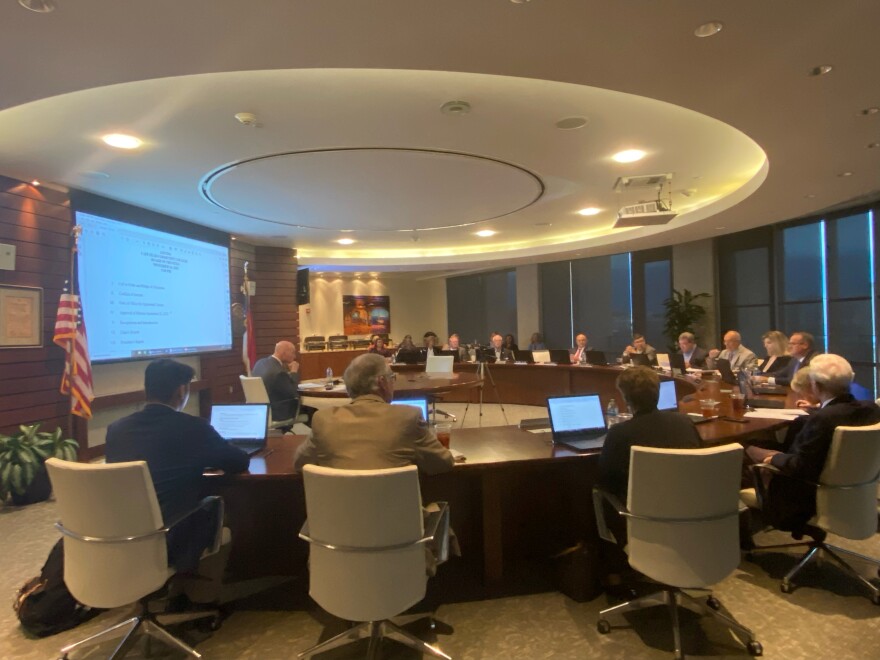The meeting started with Chair Bill Cherry giving his report — telling the board about ethics training, an upcoming holiday party, and their 2023 meetings.
When Cherry tried to close his report, Trustee Ray Funderburk asked to give a statement about New Hanover County Commission Chair Julia Olson-Boseman’s removal of former Trustee Jimmy Hopkins.
Cherry responded, “That’s not our problem. That’s between Mr. Hopkins and New Hanover County.”
Funderburk continued to say that he was “disturbed” by Cherry’s unilateral decision to agree with the Hopkins’ removal.
“Our bylaws state we are a body corporate established by an Act of the North Carolina General Assembly, not a county board,” Funderburk said.
Cherry interrupted him, and said he’d like the board to go into executive session to discuss ‘attorney-client privilege.'
Funderburk asked why – and “which attorney and which client, Sir?” He also said didn’t see why this would be considered “personnel”.
Vice-Chair Jason McLeod then made a motion to go into closed session, citing 'attorney-client privilege for a personnel issue,' while Funderburk was still asking if he could finish his public statement.
Cherry said, “You can finish your statement when we go into a closed session.”
Funderburk responded, “I’m not consulting with an attorney. I’d like to finish my statement.”
The board’s attorney Ken Gray chimed in to say, “You may be discussing matters that involve privileged issues.”
Funderburk said, “I don’t think so.”
Unfortunately, for Funderburk, the board voted unanimously (besides Funderburk and Trustee Jonathan Barfield who was absent from the meeting) to go into closed session. They were in this session for close to an hour.
When they emerged there was no further discussion of Funderburk’s statement, and the board moved on to Robby Collins’ oath of office as the newest trustee, replacing Jimmy Hopkins.
WHQR reached out to Funderburk to ask him about the public statement he had wanted to make.
In an email, Funderburk wrote, “[s]ince I completed my statement and discussed it in executive session, I cannot make any comment on it, nor can I finish saying what I started to address in the open meeting.”
Other issues with transparency and accountability
In the minutes for the Board's September meeting, which were unanimously approved this week, Michelle Lee, the board liaison and executive director of the president’s office, entirely left out Morton and Funderburk’s conversation about why there were sudden changes to the compensatory leave policy for the crew of the college’s research vessel the Cape Hatteras.
No board members noticed the issue — or, if they did, no one mentioned it.
Under state public records law, government bodies are required to keep “full, accurate” minutes of all portions of all official meetings.
This isn’t the first time Lee has failed to document what’s happened at the meetings. Former CFCC Student Body President PJ Eby gave a scathing critique of the trustees’ leadership in May 2021. All that was written was, “Ms. Eby presented comments regarding her time as SGA President.”
Trustee Zander Guy, who chairs the Administrative and Personnel Committee, announced that the committee unanimously approved employee handbook changes to include updates to the Campus Sex Crimes Prevention Act and the Lactation/Breastfeed Policy. He then asked for approval from the entire board, which passed.
Guy said this was an effort to increase “transparency and clarity,” he then winked, a facial expression noticed by several in attendance.
President Jim Morton asked Guy if he was going to speak on changes to the background check policy.
Guy said that was packaged in with the approval of the other two policies.
With this policy, the college will be conducting background checks on all prospective new employees, volunteers, contractors, and current employees.
Once employed, the college could do annual re-checks; if CFCC finds a conviction or falsified conviction information, “the applicant, contractor, volunteer or employee will be provided a copy of the criminal record and given an opportunity to review the results of the background check.”
President Jim Morton has the final authority to determine the employability of the person, and while background checks are required for all employees, he’ll also determine what level of background check is required for the position.
You can view the policy here — (pages 195-196).
Editor's note: This article initially stated that Morton had the authority to determine if a background check was required. It has been corrected to indicate that all positions require background checks, with Morton having the authority to determine the required level of background check.


